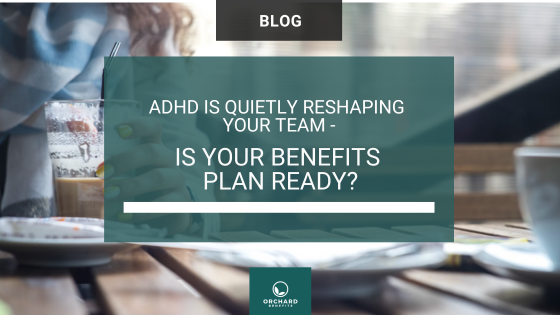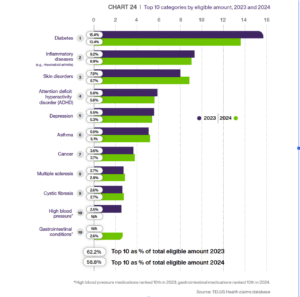If you’re running a fast-growing tech company, there’s a rising trend you can’t afford to ignore, and it’s probably already affecting your team.
ADHD, or attention-deficit/hyperactivity disorder, is a neurodevelopmental condition that impacts focus, impulse control, and executive functioning — and for adults in their 20s to 40s, it’s becoming one of the most common reasons for drug claims in Canada.
Here’s the challenge: most employees won’t raise their hand and say they’re struggling. They’ll try to push through quietly, even as it affects performance, confidence, and mental health. That’s why ADHD support (and mental health more broadly) needs to be built into your benefits plan before anyone on your team asks for it.
ADHD Isn’t Just a Childhood Diagnosis Anymore
For years, ADHD was seen as something kids grew out of, but that’s no longer true. The fastest-growing segment of ADHD diagnoses in Canada is adults, not kids. And most of them are in the exact hiring bracket for tech companies.
The claims data backs it up:
- ADHD now ranks 4th in total drug spend across private drug plans
- Two ADHD meds are among the top 10 most prescribed drugs nationally
- There’s been a 17% year-over-year increase in ADHD-related drug claims among adults
And this isn’t a fringe issue, it’s a quiet trend that’s already showing up in your team, whether you realize it or not.
ADHD Symptoms Are Often Masked — Especially in High Performers
In startup culture, masking often appears as hustle. ADHD doesn’t always show up as distraction or hyperactivity. It can appear as burnout, overcompensation, anxiety, or poor follow-through from employees.
As Kristina Rodenhurst from BeyondADHD shared at the 2025 Mental Health Summit, many of the people silently struggling with ADHD are your top performers. Often, they’re senior leaders — especially women — who’ve spent years managing symptoms without knowing the root cause.
Diagnostic tools are still mostly designed for children. Adults navigating careers, teams, and internal chaos often go undiagnosed until they reach a breaking point.
The Cost of Inaction Is Real and Quantifiable
Undiagnosed ADHD leads to an average of 22 lost workdays per year per employee.
That’s not just a mental health issue; that’s an operations issue. Left unaddressed, it compounds across teams, creating real costs in productivity, retention, and leadership capacity. The advantage for founders is that it’s also one of the easiest and highest-ROI areas to improve with the right plan design. Small changes in coverage can have a significant impact on performance and culture.
What Founders Can Do, Quietly and Proactively, For Their Team
You don’t need a significant initiative; you just need a benefits plan that’s built for the reality of modern teams:
- Cover ADHD medications and treatment through your drug plan
- Make therapy and coaching accessible through wellness or paramedical coverage
- Offer confidential EAPs that don’t require someone to go through HR
Build support early, keep it simple, and ensure it’s there when someone finally needs it.
What Ignoring ADHD Really Costs Your Team
ADHD can quietly impact focus, performance, and team dynamics without ever being named. The cost of ignoring it is burnout, turnover, and lost momentum.
But when it’s addressed early and thoughtfully, the payoff is huge:
- Generic ADHD meds are helping stabilize costs
- Assessments and early treatment improve outcomes
- Proactive plans prevent problems from becoming performance risks
If your benefits strategy isn’t evolving with this trend, it’s only a matter of time before it starts showing up in engagement, retention, and claims data.
Want help building a plan that supports mental health in a real, meaningful way? Let’s talk about what ADHD-aware benefits can look like and how they quietly build resilience into your team.



